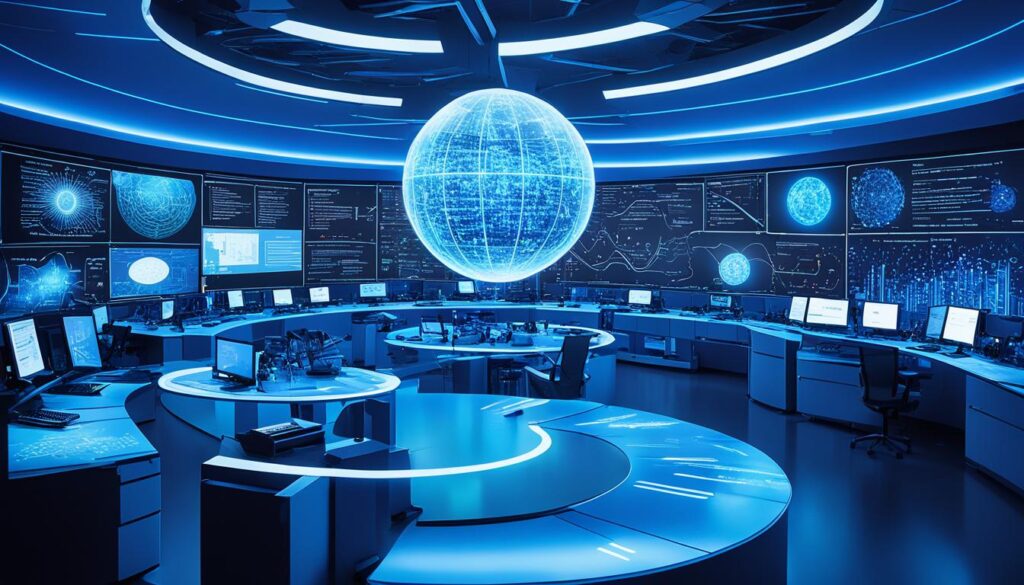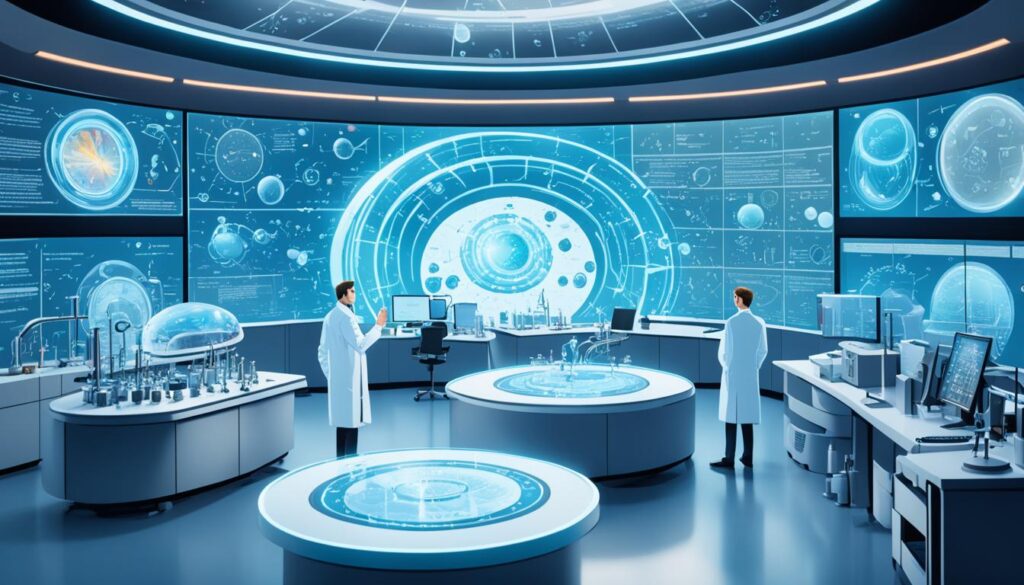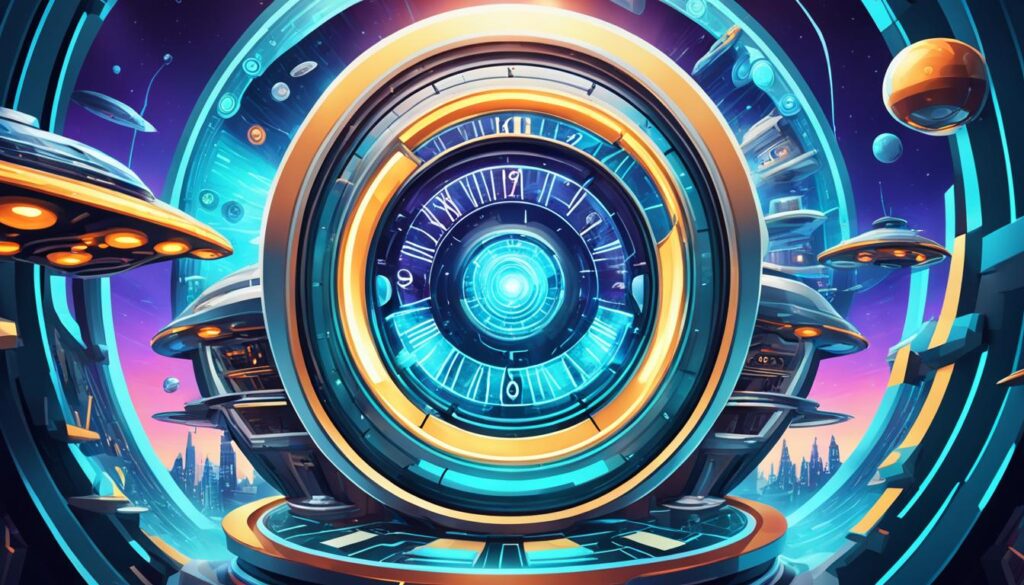Could artificial intelligence unlock the secrets of time travel? This question has intrigued scientists and dreamers for years. As we look into the future, AI and spacetime manipulation might bring us closer to what was once just in movies.
Time travel has always caught our imagination since H.G. Wells wrote “The Time Machine.” Now, with quantum physics and AI moving fast, we’re getting closer to understanding time better. But can these new tools really make time travel happen?
Recent advances in AI and quantum computing are changing what we thought was possible. From Einstein’s ideas to today’s quantum mechanics, we’re learning more about time. This article will show how AI could be the key to exploring time.
The Fascinating Intersection of AI and Time Travel
AI research is changing how we explore time. It’s a field that’s both exciting and new. Imagine using AI to recreate past events or predict what might happen if we changed history.
Now, AI looks through lots of old data to make 3D models of ancient cities. This lets us explore lost worlds without leaving our chairs. Museums are also using this tech to make history come alive in new ways.
AI does more than just show us old places. It helps understand ancient texts, revealing secrets that were lost. This is crucial for saving languages and cultures that are at risk.
As AI gets better, it becomes more important in studying time travel. It helps us simulate historical events and understand how they affected the world. Who knows what big discovery is coming next, thanks to AI and science?
Understanding Time: The Foundation of Temporal Exploration
Time has always been a mystery to scientists. It’s a key part of how we see the universe. But did you know time isn’t always constant?
The Nature of Time in Physics
In physics, time is a dimension that sets the order of events. It’s more than just the clock on your wall. The way time flows can change with your speed and where you are in the universe. This idea comes from Einstein’s theories of relativity.
Einstein’s Theories and Their Implications
Albert Einstein changed how we see time with his theories of relativity. He talked about time dilation, where time moves slower for fast-moving objects or those in strong gravity. This is why GPS satellites need constant updates.
Quantum Mechanics and Time Reversibility
Quantum mechanics makes time even more complex. At this level, some things might be reversible. This makes us wonder about time’s true nature. Could we travel through time at the smallest scales?
Time travel is still in science fiction for now. But these theories open up new possibilities. Maybe one day, you’ll visit the past or future, just like in Doctor Who!
Theoretical Possibilities: Wormholes and Time Dilation
Time travel is a fascinating topic that science explores. Wormholes, which are tunnels through spacetime, could make time travel possible. Einstein’s theories suggest these tunnels might exist. To make a wormhole, we need to find particles with negative mass and energy.
Time dilation is another mind-bending idea that is real. Clocks on the International Space Station tick slower than those on Earth because of gravity. This effect gets even more extreme at high speeds. If you went at 95% of the speed of light, time would seem to slow down a lot for you.
Spacetime warping is key to these effects. Near strong gravity, like Earth’s, time moves slower than in areas farther away. This bending of spacetime helps us understand how time travel could work.
While we have small-scale time travel, big journeys are still just ideas. Scientists think we might figure out time travel in 50 to 100 years. But going back in time might break the laws of physics. The future of time travel depends on scientific discoveries and our ability to use a lot of energy.
AI’s Role in Advancing Time Travel Research
AI is changing how we think about time travel. Quantum computing is leading this charge. These machines can process information much faster than regular computers. This lets us explore new ways to understand spacetime.
Quantum Computing and Spacetime Simulations
Quantum computers handle complex tasks that were once too hard. They help scientists study spacetime itself. By doing so, they might reveal secrets about time at the smallest levels.

AI-Driven Predictive Models for Future Events
AI is getting smarter at predicting what will happen next. It looks through huge amounts of data for patterns. This could lead to better predictions of future events. Some believe these predictions might even suggest ways to travel through time.
Machine Learning in Analyzing Temporal Dynamics
Machine learning is changing how we see time. It finds patterns in how things change over time. This could be crucial for understanding time travel.
While time travel is still in the realm of science fiction, AI is getting us closer to understanding it. As quantum computing and predictive models get better, we might see big breakthroughs.
Paradoxes in Time Travel: Unraveling Complexities
Time paradoxes have always caught the interest of scientists and fans of sci-fi. The grandfather paradox is a classic thought experiment. Imagine going back in time and stopping your grandfather from meeting your grandmother. This would mean you would never be born, which is a logical contradiction.
Then there’s the bootstrap paradox. It happens when something or information has no clear beginning. Think about getting a book from a time traveler, then giving it to the author when you go back in time. The big question is: who actually wrote the book?
Scientists have come up with ways to solve these paradoxes. The multiverse theory is one idea. It says every time travel choice creates a new timeline. This way, the grandfather paradox is solved because there are many realities.
Quantum entanglement is another idea for time travel. It’s when particles connect instantly, no matter how far apart they are. Using quantum entanglement for time travel is hard, but it could lead to new discoveries.
Exploring time travel shows us how our ideas about cause and effect are always changing. These paradoxes push us to think differently and inspire new scientific discoveries.
Will AI Make Time Travel Possible in My Lifetime?
Time travel sparks our imagination, and AI is making it seem closer. We’ll look at how AI is changing our view of time.
Current AI Capabilities and Limitations
AI has made big steps in science, but time travel is still a dream. Today, AI is great at complex simulations and predicting the future. These skills could help us explore time in the future.

Projected Advancements in AI Technology
AI is moving fast. Ray Kurzweil says we’ll see a century’s progress in just seven years by 2021. This could lead us to understand time better. By 2050, AI could change our world a lot, maybe even help us discover new ways to travel through time.
Expert Opinions on AI-Enabled Time Travel
Experts have different views, but many think AI will be key in time travel research. Some scientists think AI can solve the big challenges we face now. As AI gets better, it might open new doors for us to explore time, making time travel a reality in our lifetimes.
Ethical Considerations of Time Manipulation
Time travel ethics bring up big questions about changing historical events. Your actions in the past could change the future a lot. Imagine bringing technology from centuries ahead into the past. This could speed up changes in society, changing history in big ways.
Keeping history as it is is important when traveling through time. Changing big events, like the Cuban Missile Crisis, could stop a war but change the world a lot. Such changes might make people feel powerless and change how they see the world.
Time travel also brings up paradoxes. The grandfather paradox asks what if you stopped your own birth? These situations make us think about the right thing to do when changing events that affect your own life.
AI is key in looking at the ethics of time travel. But, a survey of 602 experts showed worries about AI’s focus on ethics. 68% think by 2030, most AI won’t focus on ethics for the good of all. This makes us wonder about AI’s role in making decisions about time travel.
AI-Powered Simulations: Exploring Temporal Environments
AI-driven simulations are changing how we see time and its complexities. They let us explore time without the risks of actually changing it. Experts worry about new tech, showing how important it is to explore this area carefully.
Creating Virtual Time Travel Scenarios
Picture stepping into a digital world where you can see past events or future possibilities. AI simulations make this real, offering detailed time environments for research. These scenarios use real data, making them feel like advanced video games.
Some games even include real events like the COVID-19 pandemic, mixing reality with simulation.
Analyzing Consequences of Temporal Alterations
AI analysis in these simulations is great for seeing how changing time affects things. By trying out different scenarios, AI predicts the effects of time changes. This is similar to how AI helps in other areas, like predicting weather or improving farming.
Refining Our Understanding of Time Mechanics
As AI simulations get better, they’re helping us understand time better. These virtual tests let scientists try out time travel ideas safely. While some experts worry about new tech, AI could unlock time’s secrets, offering exciting discoveries.
